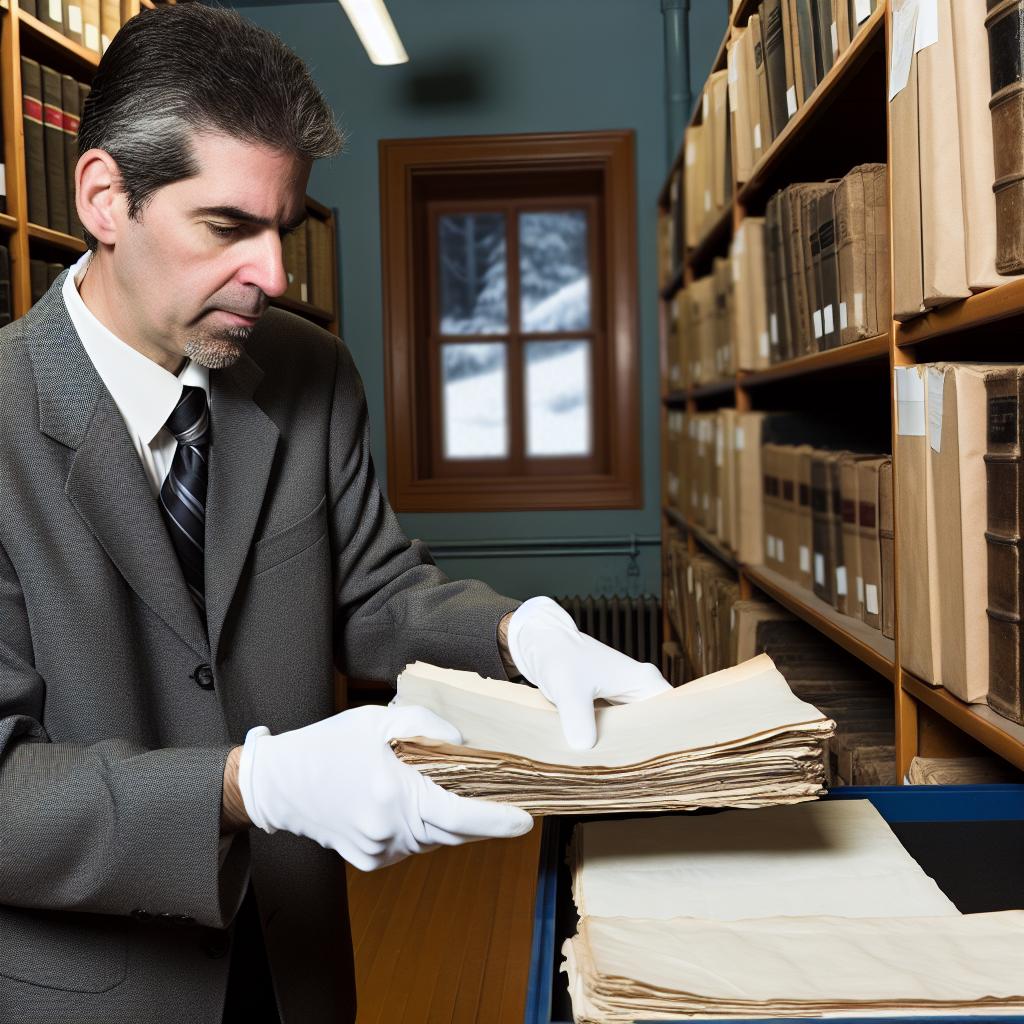Introduction to the Role of Archivists in Canada
Archivists play a crucial role in preserving Canada’s cultural heritage.
They safeguard records that document the nation’s history.
These professionals manage various types of information, ensuring accessibility.
Moreover, they facilitate research by organizing and classifying documents.
Responsible for Preservation
Archivists are responsible for the preservation of both physical and digital records.
This includes photographs, manuscripts, and government documents.
They utilize specialized techniques to protect materials from deterioration.
Additionally, they ensure that digital files remain functional over time.
Facilitating Access to Information
Access to historical documents is vital for researchers and the public.
Archivists create detailed finding aids to help users locate information efficiently.
They also provide training and support in archival research methods.
Consequently, they play an essential role in educational initiatives.
Engaging with the Community
Archivists often collaborate with community groups and organizations.
They host exhibitions, public events, and informative workshops.
This engagement promotes awareness of archival resources in local areas.
Furthermore, it helps foster a connection between the community and their history.
Overview of the Challenges Faced by Archivists
Budget Constraints
Budget constraints significantly impact archivists in Canada.
Many institutions struggle with limited financial resources.
This limitation often leads to cuts in crucial preservation programs.
Archivists frequently face insufficient funding for technology upgrades.
As a result, they must find creative solutions to manage resources.
Additionally, lower budgets often force layoffs or reallocation of staff.
These restrictions can hinder the development of comprehensive archives.
Funding Issues
Funding issues present a persistent challenge for archivists.
Many archivists rely on grants and government support.
Unlock Your Career Potential
Visualize a clear path to success with our tailored Career Consulting service. Personalized insights in just 1-3 days.
Get StartedCompetition for these funds can be fierce and limiting.
Additionally, changing government priorities can affect funding stability.
Some organizations may not receive consistent financial backing.
This uncertainty complicates long-term planning and project development.
Ultimately, funding volatility hampers the overall effectiveness of archives.
The Impact of Technology on Archival Practices
Current Technological Advancements
Technology has transformed archival practices dramatically in recent years.
Digital storage solutions have replaced traditional methods for many archivists.
Furthermore, online databases provide easier access to archival materials.
For instance, organizations like the Canadian Archives have embraced digitization.
This shift enhances preservation and makes materials more accessible to the public.
Challenges Posed by Technology
Despite its benefits, technology introduces several challenges for archivists.
One major concern involves the rapid obsolescence of digital formats.
Archivists must continually adapt to new software and hardware upgrades.
Moreover, there is a constant need for training in digital archiving techniques.
Data security also presents a significant challenge for archival institutions.
Balancing Digital and Physical Archives
Archivists must balance their focus between digital and physical collections.
This balance requires careful consideration of storage space and resource allocation.
Moreover, hybrid models that combine both formats are increasingly common.
The challenge lies in ensuring both formats receive adequate attention.
Collaboration among archivists can enhance their ability to manage both types of archives.
Future Implications for Archival Practices
Looking ahead, technology will continue to shape archival practices.
Archivists must remain vigilant in monitoring technological trends.
Certainly, innovation will drive new methods for preserving history.
As a result, ongoing education will become essential for professionals in the field.
Ultimately, the successful integration of technology can bolster the relevance of archives.
Learn More: The Path to Becoming a Certified Archivist in Canada
Navigating the Complexities of Digital Preservation and Access
Challenges of Digital Preservation
Archivists face several challenges in digital preservation.
Rapidly evolving technology complicates data management.
Data formats can become obsolete quickly.
This results in potential loss of significant cultural heritage.
Moreover, ensuring long-term access requires constant vigilance.
Organizations must develop robust preservation strategies.
Digital Archives and Accessibility
Maintaining accessibility is another critical concern.
Users expect easy access to digital collections.
However, balancing access with security is challenging.
Archivists must implement effective user authentication methods.
This ensures that sensitive materials are protected.
Collaborative Efforts in the Field
Collaboration among institutions plays a vital role.
Archivists often partner with digital libraries for best practices.
These partnerships can enhance resource sharing.
Additionally, they provide a platform for shared knowledge.
Advancing Skills and Knowledge
New technologies require continuous professional development.
Archivists need training in data management and preservation software.
Moreover, they must stay informed on digital preservation trends.
Workshops and conferences offer excellent opportunities for learning.
The Rewards of Digital Archiving
Despite the challenges, digital archiving brings many rewards.
Accessing digital materials can engage a broader audience.
It helps in promoting cultural awareness and education.
Additionally, successful digital projects can enhance institutional reputation.
Ultimately, the impact of well-preserved digital collections is significant.
See Related Content: The Role of Authenticity in Canadian Digital Content Creation
The Importance of Collaboration with Other Institutions and Communities
Enhancing Preservation Efforts
Collaboration strengthens preservation efforts among archivists and institutions.
Working together, they pool resources effectively.
This shared approach leads to better preservation and access to materials.
Moreover, it creates a stronger foundation for research and education.
Expanding Access to Collections
Collaborating with various institutions broadens access to diverse collections.
Regional and national dialogues encourage the sharing of artifacts.
This exchange promotes inclusivity and diversity among historical narratives.
Consequently, communities benefit from a richer understanding of their heritage.
Developing Best Practices
Archivists often work together to develop best practices in documentation.
Sharing experiences and challenges improves everyone’s skills.
This collaborative learning enhances standards across the sector.
Additionally, it encourages innovation in archival practices.
Building Community Relationships
Strong relationships with local communities foster trust and collaboration.
Engagement activities increase awareness of archival importance.
These relationships lead to community-driven projects that enrich collections.
Understanding local histories strengthens the archivist’s role as a community resource.
Networking and Professional Development
Attending workshops and conferences facilitates networking opportunities.
These events enable knowledge sharing with peers and experts.
Furthermore, they provide platforms for discussing current challenges.
Networking enhances professional growth and inspires future collaborations.
Advocating for Funding and Support
Collaborative initiatives often attract funding and support from governmental bodies.
Working together, archivists can present a stronger case for financial assistance.
This collective advocacy ensures sustainability of resources for all institutions.
Consequently, it benefits the archival community as a whole.
Delve into the Subject: Best Places in Canada to Hone Your Photography Skills

Rewards of Being an Archivist
Preserving Cultural Heritage
Being an archivist allows you to safeguard important documents.
You play a vital role in conserving cultural heritage.
Each item in an archive represents a piece of history.
By preserving these items, you ensure they are accessible for future generations.
Archives offer a glimpse into the lives of those who came before us.
Moreover, they tell the story of various communities across Canada.
This responsibility can be incredibly fulfilling.
Contributing to Historical Research
Archives are essential resources for researchers and historians.
As an archivist, you support academic pursuits and scholarship.
Your work aids in uncovering lost narratives and preserving them.
This engagement often leads to new discoveries and insights.
Additionally, it helps shape the understanding of our past.
Many historians rely on archival materials to complete their work.
Thus, your contributions are invaluable to academia.
Building Community Connections
Archivists often engage with the community through various initiatives.
Working with local organizations helps promote cultural awareness.
Collaborations can lead to exhibitions and public programs.
These events foster a sense of belonging and shared history.
Furthermore, being an archivist allows for the sharing of stories.
Through outreach, you can inspire interest in heritage preservation.
This outreach fosters a community-centered approach to archiving.
Developing Professional Skills
Working as an archivist enhances a variety of professional skills.
You develop strong organization and detail-oriented abilities.
Additionally, digital archiving skills become increasingly important.
As technology evolves, so do your skills in managing electronic records.
Furthermore, you gain expertise in preservation techniques.
These skills can open doors to exciting career opportunities.
The field offers continuous learning and professional development.
Discover More: Effective Strategies for Growing Your Content Creator Brand
Opportunities for Professional Development and Career Growth in the Field
Continuing Education and Certifications
Archivists can enhance their skills through continuing education programs.
Various institutions offer specialized courses in archival science.
Obtaining relevant certifications can also bolster career prospects.
For example, the Certified Archives Manager (CAM) credential is valuable.
Many archivists pursue professional development through workshops and seminars.
Networking and Professional Organizations
Joining professional organizations can open doors for archivists.
Organizations like the Association of Canadian Archivists (ACA) provide resources.
Members often gain access to networking events and conferences.
Networking can lead to collaboration opportunities and mentorships.
Connecting with peers fosters a sense of community within the field.
Mentorship and Support Systems
Finding a mentor is a significant step in career development.
Mentors can provide guidance and share industry insights.
Support systems within organizations also contribute to growth.
Participating in professional groups enhances skill development.
These networks help archivists share experiences and knowledge.
Job Shadowing and Internships
Job shadowing offers practical experience in archival settings.
Internships allow archivists to apply theoretical knowledge in real scenarios.
Both offer insights into day-to-day operations within an organization.
These opportunities can lead to job offers or invaluable connections.
Many archivists benefit from hands-on learning experiences.
Online Resources and Webinars
The digital age provides numerous online resources for archivists.
Webinars allow professionals to learn from experts in real-time.
Online courses expand access to knowledge without geographical barriers.
These resources cater to varying levels of experience and expertise.
Staying updated with trends is crucial in this evolving field.
The Role of Advocacy and Public Engagement in Promoting Archival Work
Importance of Advocacy
Advocacy plays a vital role in the archival profession.
It helps raise awareness about the value of archives.
Through advocacy, archivists showcase their relevance in society.
Individuals like Emily Grant emphasize the importance of community visibility.
Building Relationships
Public engagement fosters strong relationships with communities.
Collaborative projects excite both archivists and the public.
For example, local history initiatives can attract diverse participation.
Working together cultivates a sense of ownership among community members.
Educational Outreach
Education is a powerful tool for promoting archival work.
Workshops and presentations can engage various audiences effectively.
Archivists often partner with schools to enhance historical understanding.
Such initiatives highlight the vital role of archives in education.
Utilizing Digital Platforms
Digital tools transform the way archivists connect with the public.
Websites and social media enhance outreach efforts significantly.
Email newsletters keep stakeholders informed about events and resources.
Moreover, virtual exhibits make archival materials accessible globally.
Measuring Impact
To be effective, advocacy efforts require assessment and flexibility.
Collecting feedback helps improve strategies and initiatives.
Setting measurable goals allows archivists to monitor progress clearly.
For instance, tracking visitor numbers can demonstrate engagement success.




